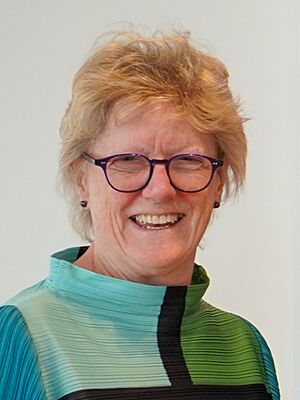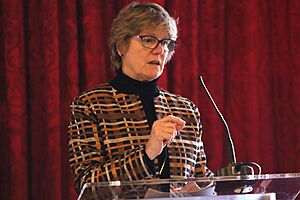Sally Davies (doctor) facts for kids
Quick facts for kids
Dame
Sally Davies
|
|
|---|---|

Davies in 2024
|
|
| Master of Trinity College, Cambridge | |
| Assumed office 8 October 2019 |
|
| Preceded by | Sir Gregory Winter |
| Chief Medical Officer for England | |
| In office 1 June 2010 – 1 October 2019 |
|
| Preceded by | Sir Liam Donaldson |
| Succeeded by | Chris Whitty |
| Personal details | |
| Born |
Sally Claire Davies
24 November 1949 Birmingham, England |
| Spouses |
Ralph Skilbeck
(m. 1972; div. 1982)P. R. A. Vulliamy
(m. 1982; died 1982)Willem H. Ouwehand
(m. 1989) |
| Children | 2 |
| Parent |
|
| Alma mater | |
| Occupation | Master, Trinity College Cambridge |
| Profession | Physician (haematologist) |
| Awards | Cameron Prize of the University of Edinburgh (2017) Suffrage Science award (2011) |
Dame Sally Claire Davies (born 24 November 1949) is a British doctor. She was the most senior doctor for England, known as the Chief Medical Officer, from 2010 to 2019. She also served as the Chief Scientific Adviser for the Department of Health.
Before these roles, she was a clinician, which means she treated patients. She specialized in blood and bone marrow diseases. Since October 2019, she has been the Master of Trinity College, Cambridge, a very important position at the university. Dame Sally is also one of the people who helped start the National Institute for Health and Care Research.
Contents
Early Life and Education
Sally Davies was born in Birmingham, England, on 24 November 1949. Her father, John Gordon Davies, was a priest and a scholar. Her mother, Emily Mary Tordoff, was a scientist. Both of her parents became professors at the University of Birmingham.
Sally went to Edgbaston High School for Girls in Birmingham. She was very good at playing the viola, a musical instrument. She later studied medicine at the University of Manchester. She earned her first medical degree in 1972. Later, she received a Master of Science (MSc) degree from the University of London.
Career and Medical Research
After her early medical training, Sally Davies took a break from medicine. She lived in Madrid for four years. She returned to medical training in the late 1970s.
In 1985, she became a specialist in haematology, which is the study of blood. She worked at the Central Middlesex Hospital in London. By 1997, she became a Professor there, focusing on blood disorders.
Dame Sally is an expert in sickle cell disease. This is a blood condition that mostly affects people of African heritage. It can cause painful episodes, especially when someone is under physical stress.
She has written many academic papers and a book called The Drugs Don't Work: A Global Threat (2013). This book discusses the problem of medicines becoming less effective.
Working for the Government
In 2004, Dame Sally started working for the government. She took a research job in London. Soon, she was promoted to lead research and development at the Department of Health.
In 2006, she helped expand research in the National Health Service (NHS). She did this by creating the National Institute for Health and Care Research. She also became the Chief Scientific Adviser for the Department of Health and Social Care.
Chief Medical Officer Role
In June 2010, Sally Davies became the interim Chief Medical Officer (United Kingdom) for England. She was officially given the job the next year. She was the first woman to hold this important position. The Chief Medical Officer is the most senior doctor working for the government.
This role means she advises the government on health matters. She also helps shape health policies for the National Health Service.
Dame Sally has spoken a lot about antimicrobial resistance. This is when germs become resistant to medicines like antibiotics. She has worked to make this a global priority. She also oversaw annual reports on public health.
In her 2014 annual report, Dame Sally said that tackling obesity should be a national priority. She also suggested a national review of ovarian cancer. She encouraged people to talk openly about topics like menopause and incontinence. She wanted to make sure embarrassment did not stop people from getting help.
In January 2016, she updated the recommended weekly alcohol limits. The new guidelines warned about the link between alcohol and some types of cancer.
Dame Sally has also suggested banning promotions and advertising for unhealthy foods. She wants plain packaging for junk foods, similar to cigarettes. She also thinks there should be higher taxes on foods high in fat, salt, or sugar. She believes the public wants the government to protect children from unhealthy food marketing.
COVID-19 Pandemic
Dame Sally Davies has commented on the state of the NHS. She noted that the UK had fewer doctors, nurses, hospital beds, and ventilators compared to similar countries. Experts also pointed out that government spending cuts had affected the NHS and public health system. This made it harder for the country to deal with the COVID-19 pandemic.
Master of Trinity College, Cambridge
On 8 February 2019, it was announced that Dame Sally would become the next Master of Trinity College, Cambridge. She took up the role on 8 October 2019. She is the first woman to hold this position at Trinity College.
In 2022, Trinity College created a fund to help Ukrainian students. This was after the Russian invasion of Ukraine.
UK Special Envoy on Antimicrobial Resistance
In June 2019, Dame Sally was appointed as the UK Special Envoy on Antimicrobial Resistance (AMR). In this role, she represents the UK government on this issue around the world. She also advises the government on its plans to fight AMR.
She is also part of international groups working on antimicrobial resistance. These include the United Nations Interagency Coordination Group on Antimicrobial Resistance.
Awards and Honours
In February 2013, Dame Sally Davies was named one of the most powerful women in the United Kingdom by the BBC Radio 4 programme Woman's Hour. In 2015, she was ranked as the most influential woman in the English NHS.
In 2009, she was made a Dame Commander of the Order of the British Empire (DBE) for her work in medicine.
She was elected a Fellow of the Royal Society (FRS) in 2014. She also became a Fellow of the Academy of Medical Sciences (FMedSci) in 2002. In 2017, she received the Cameron Prize of the University of Edinburgh.
In 2020, Dame Sally became the second woman ever to be appointed Dame Grand Cross of the Order of the Bath (GCB). This was for her contributions to public health and research. She received this honour at Buckingham Palace on 5 March 2020.
Personal Life
In 1974, Sally Davies married Ralph Skilbeck. They divorced in 1982. She remarried in 1982, but her second husband passed away later that year. In 1989, she married Willem H. Ouwehand, a professor who also specializes in blood. They have two daughters together.
 | Sharif Bey |
 | Hale Woodruff |
 | Richmond Barthé |
 | Purvis Young |


